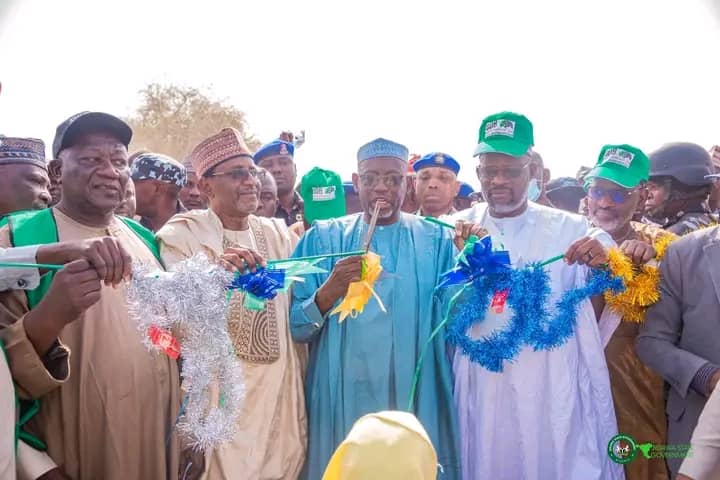Economy
Food Security: Jigawa Govt Commissions Lallashi Borehole-Based Irrigation Scheme

|
Getting your Trinity Audio player ready...
|
Food Security: Jigawa Govt Commissions Lallashi Borehole-Based Irrigation Scheme
By Hussaini Ibrahim
In yet another step towards achieving food security and improving livelihoods, Governor Malam Umar Namadi commissioned the Lallashi Borehole-Based Irrigation Scheme in the Maigatari Local Government Area of the state.
The project, powered by solar energy and utilizing semi-conduit and drip irrigation techniques, marks a significant milestone in the state’s drive to modernize agriculture and ensure all-year-round farming.
Speaking at the commissioning ceremony, Governor Namadi highlighted the importance of the project, describing it as “a clear demonstration of the commitment of our administration to achieving food security, providing sustainable means of livelihood, and reducing poverty among the people.”
The governor reiterated that one of the key priorities of this administration’s 12-Point Agenda is the full exploitation of Jigawa’s agricultural potential through year-round farming, adding that his administration is taking deliberate steps to rehabilitate and expand irrigation facilities across the state, including dams and borehole-based irrigation schemes.
“Most of us here present will recall that one of our major declarations in the agricultural sector, as reflected in the 12-Point Agenda, is to fully exploit the state’s agricultural potential through all-year-round production by bringing more of our rich agricultural lands under cultivation,” he said.
The Lallashi irrigation scheme covers 10 hectares of farmland and is supported by four industrial boreholes, and so far, over 80 smallholder farmers are directly benefiting from the initiative, which is expected to boost crop yields significantly and provide economic opportunities.
The governor also announced that similar projects in other places, such as Kafin Hausa and Birniwa Local Government Areas, are nearing completion and will soon be commissioned.
“The project, which covers 10 hectares of land, is based on 4 industrial boreholes powered by solar energy using semi-conduit and drip irrigation techniques. Up to eighty smallholder farmers are currently directly involved in cultivating the 80 hectares. It is worthy of note that two other similar projects in Kafin Hausa and Birniwa Local Governments are currently ongoing and soon to be completed and commissioned as well, In Shaa Allah.”
To further expand upland irrigation, according to Governor Namadi, the 2025 budget includes allocations for additional borehole-based irrigation projects in Gumel, Sule Tankarkar, and Gagarawa local governments.
“We have also made adequate budgetary provisions in the 2025 budget to scale up similar upland bore-based irrigation projects in other non-fadama parts of the state, including in Gumel, Sule Tankarkar, and Gagarawa local government areas.”
Governor Namadi emphasized that this intervention is aimed at empowering farmers who have long relied on seasonal rainfalls to till their lands.
“For too long, our farmers in these and other similar areas relied solely on seasonal rainfalls, limiting their ability to produce food and earn a sustainable income. With this borehole-based irrigation system, we are changing that reality. This project will enable year-round farming, increase crop yields and production levels, and open economic opportunities for the people of Lallashi and beyond.”
“Agriculture remains the backbone of Jigawa State’s economy, and we are determined to institute long-lasting transformations in the sector, including the modernization and expansion of irrigation facilities across the state. This scheme is not an isolated effort; rather, it is part of a broader plan to ensure that more communities benefit from sustainable water sources for farming.”







